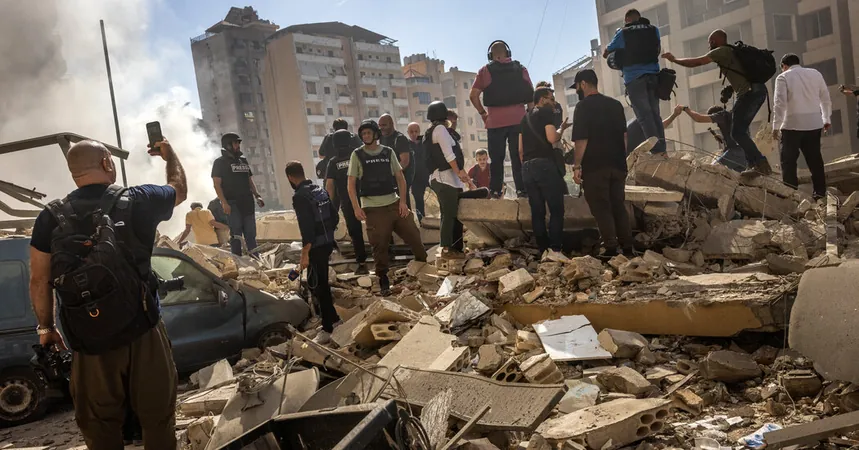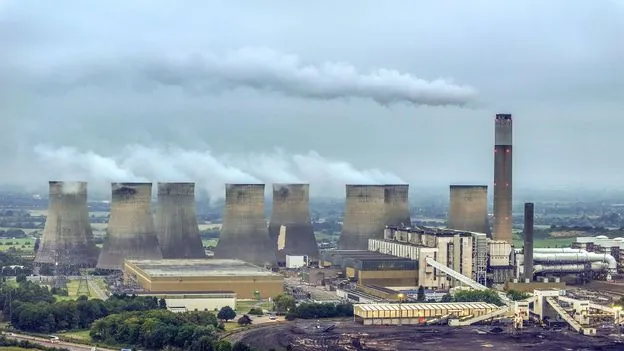
Ongoing Clashes Between Israeli Forces and Hezbollah Escalate Amidst Regional Tensions: Latest Developments
2024-10-02
Author: Jia
Ongoing Clashes Between Israeli Forces and Hezbollah Escalate Amidst Regional Tensions: Latest Developments
Israel reported that eight of its soldiers have been killed within the initial 36 hours of fighting against Hezbollah in Lebanon, marking a significant loss compared to the weekly casualties observed in the ongoing conflict in Gaza. Specific details regarding the deaths of these soldiers have not been disclosed, although prior statements from the Israeli military indicated intense close-quarters combat.
This surge in violence in Lebanon follows Iran's recent missile barrage aimed at Israel, where approximately 200 missiles were launched on Tuesday. The majority of these were intercepted by Israel’s air defense systems, which benefitted from U.S. support. Israeli Prime Minister Benjamin Netanyahu remarked that Iran “made a big mistake” and will “pay for it,” signaling escalated tensions between the two nations.
In a show of solidarity, U.S. President Joe Biden affirmed that while he supports Israel's right to respond to the missile attacks, any military action must be proportional. The G7 leaders have collectively resolved to impose additional sanctions on Iran in response to its military actions.
The Iranian regime's Islamic Revolutionary Guards Corps stated that the missile attacks were retaliation for the assassination of key leaders from Hezbollah and Hamas, proxies engaged in fighting against Israel.
In a series of verified incidents, video footage revealed numerous missile explosions throughout various regions in Israel, including close proximity to the Mossad headquarters. Although Israeli forces confirmed that an air base was struck, they asserted that critical infrastructure remained intact. Sporadic damage was noted at a school in southern Israel and buildings in Tel Aviv.
The situation has continued to deteriorate with urban confrontations escalating. In Tel Aviv, Hamas' armed group, the Qassam Brigades, claimed responsibility for a violent assault on a light rail train, resulting in seven fatalities. The suspects reportedly attacked a soldier and seized his weapon, illustrating the rising violence against Israeli citizens.
At an emergency session of the United Nations Security Council, representatives from both Israel and Iran exchanged accusations, with Israel's ambassador arguing for significant consequences for Tehran's missile strike. In retaliation, Iran’s ambassador threatened further military action should Israel provoke them.
Recent developments highlight Israel's intense military operations inside Lebanon, aimed directly at Hezbollah amid fears of an all-out conflict involving regional powers. Analysts suggest that military consensus within Israel favors direct action against Iran, underscoring a strategic pivot following a series of deadly attacks believed to be orchestrated or supported by Iranian allies.
The historical backdrop places Iran's ballistic missile program as one of the most formidable in the Middle East, reportedly boasting over 3,000 missiles with capabilities extending more than 1,200 miles. The ramifications of this ongoing conflict extend potentially into global markets, particularly concerning oil production, as any disruption could escalate:
Potential military strikes could target Iran’s oil facilities, severely impacting its economy.
A sustained military campaign might worsen humanitarian conditions in the region with calls for diplomatic resolutions growing increasingly dire.
Despite ongoing hostilities, there is speculation regarding the U.S. administration’s capacity to influence Israel’s strategic choices. As diplomatic efforts begin to falter, fears are mounting regarding an unintended escalation that could draw multiple countries into a broader conflict.
As Israel continues to face threats from Hamas and Hezbollah, vigilance remains critical as the consequences of miscalculation could amplify the cycle of retaliation and violence across the region. Amidst an atmosphere of tension, many in Israel now perceive the fight against Iranian-backed groups as essential for national security, indicating a potential shift towards more aggressive Israeli policies in the face of escalating threats.
As we await further developments, the ongoing clashes serve as a stark reminder of the fragile and volatile dynamics in the Middle East, with the potential for either widespread conflict or diplomatic intervention hanging in the balance.



 Brasil (PT)
Brasil (PT)
 Canada (EN)
Canada (EN)
 Chile (ES)
Chile (ES)
 España (ES)
España (ES)
 France (FR)
France (FR)
 Hong Kong (EN)
Hong Kong (EN)
 Italia (IT)
Italia (IT)
 日本 (JA)
日本 (JA)
 Magyarország (HU)
Magyarország (HU)
 Norge (NO)
Norge (NO)
 Polska (PL)
Polska (PL)
 Schweiz (DE)
Schweiz (DE)
 Singapore (EN)
Singapore (EN)
 Sverige (SV)
Sverige (SV)
 Suomi (FI)
Suomi (FI)
 Türkiye (TR)
Türkiye (TR)